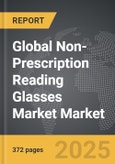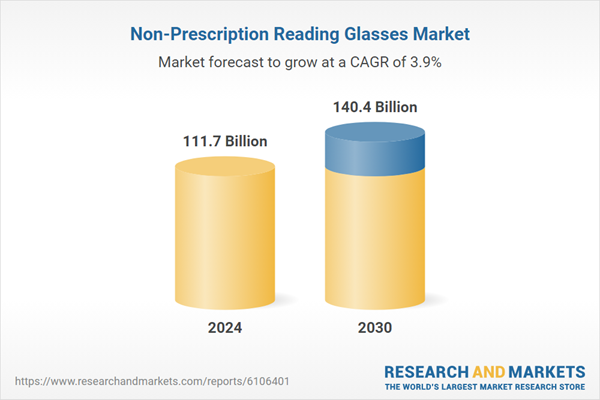Global Non-Prescription Reading Glasses Market - Key Trends & Drivers Summarized
Why Are Non-Prescription Readers Gaining Widespread Popularity Among Adults?
Non-prescription reading glasses are increasingly becoming a preferred choice for individuals experiencing age-related vision changes, particularly presbyopia. These glasses offer immediate, off-the-shelf support for near-vision tasks such as reading, crafting, and screen use without requiring a prescription or optometric consultation. Many adults begin experiencing presbyopia in their 40s and opt for these convenient solutions to address everyday visual discomfort.Availability through pharmacies, supermarkets, and online platforms has made non-prescription readers accessible to a wide audience. Consumers frequently purchase multiple pairs for use in different settings - home, office, travel, or leisure - treating them as practical accessories rather than long-term optical investments. Their affordability, ease of access, and functionality contribute to their steady integration into daily routines, especially among those looking for immediate vision support without clinical intervention.
How Are Design Improvements Enhancing Appeal and Functionality?
Product design has evolved to meet growing expectations around comfort, durability, and aesthetics. Manufacturers now offer frames in a variety of shapes, materials, and finishes to cater to diverse style preferences. Lightweight construction using materials like plastic, aluminum, and flexible alloys helps reduce pressure during extended wear. Features such as spring hinges, adjustable nose pads, and soft temples enhance overall fit and user comfort.Lens technology has also advanced. Anti-glare, anti-scratch, and blue light filtering coatings are now standard in many offerings, catering to individuals who spend long hours on digital devices. Some models include tinted or photochromic lenses for users who require adaptable vision indoors and outdoors. These enhancements not only improve visual experience but also position non-prescription readers as multi-purpose accessories that go beyond basic magnification.
What Channels and Purchase Patterns Are Reshaping the Market Landscape?
Retail and online channels continue to expand the market's reach, allowing consumers to browse and purchase non-prescription readers with ease. Supermarkets, pharmacies, optical stores, and general merchandise retailers stock a wide range of magnifications and frame designs to meet different user needs. E-commerce platforms further simplify the buying process through virtual try-on features, detailed filters, and subscription services that cater to users who frequently replace or update their glasses.Multi-pack purchases and bundled offerings have become common, especially among consumers who prefer to keep multiple pairs in various locations. Travel retailers, corporate wellness programs, and elder care services are also including reading glasses as part of broader product bundles or value-added packages. This widespread distribution and cross-industry adoption are transforming reading glasses from a purely functional product to a lifestyle convenience.
Growth in the non-prescription reading glasses market is driven by several factors.
The rising prevalence of presbyopia, particularly among aging adults, continues to create steady demand for near-vision correction without the need for medical prescriptions. As more consumers seek practical and affordable solutions, expanded availability through retail and e-commerce channels has made it easier to access a wide range of styles and magnifications. Advancements in lens technologies, including blue light filtering and anti-reflective coatings, are improving product functionality and encouraging repeat purchases. At the same time, growing use of reading glasses in workplace settings, travel kits, and wellness programs is broadening their relevance beyond personal use. The market is also benefiting from increased interest in convenience-driven self-care, with users opting for multiple pairs for different occasions. In response, manufacturers are introducing unisex, design-focused collections that appeal to younger and style-conscious buyers, further strengthening the category's reach and consumer base.Report Scope
The report analyzes the Non-Prescription Reading Glasses market, presented in terms of market value (US$). The analysis covers the key segments and geographic regions outlined below:- Segments: Type (Full Frame Glass, Frameless Glass, Half Frame Glass); Distribution Channel (Online Distribution Channel, Retail Distribution Channel, Optical Stores); Application (Adults Application, Kids Application).
- Geographic Regions/Countries: World; United States; Canada; Japan; China; Europe (France; Germany; Italy; United Kingdom; Spain; Russia; and Rest of Europe); Asia-Pacific (Australia; India; South Korea; and Rest of Asia-Pacific); Latin America (Argentina; Brazil; Mexico; and Rest of Latin America); Middle East (Iran; Israel; Saudi Arabia; United Arab Emirates; and Rest of Middle East); and Africa.
Key Insights:
- Market Growth: Understand the significant growth trajectory of the Full Frame Glass segment, which is expected to reach US$80.9 Billion by 2030 with a CAGR of a 3.1%. The Frameless Glass segment is also set to grow at 5.2% CAGR over the analysis period.
- Regional Analysis: Gain insights into the U.S. market, valued at $30.4 Billion in 2024, and China, forecasted to grow at an impressive 7% CAGR to reach $28.2 Billion by 2030. Discover growth trends in other key regions, including Japan, Canada, Germany, and the Asia-Pacific.
Why You Should Buy This Report:
- Detailed Market Analysis: Access a thorough analysis of the Global Non-Prescription Reading Glasses Market, covering all major geographic regions and market segments.
- Competitive Insights: Get an overview of the competitive landscape, including the market presence of major players across different geographies.
- Future Trends and Drivers: Understand the key trends and drivers shaping the future of the Global Non-Prescription Reading Glasses Market.
- Actionable Insights: Benefit from actionable insights that can help you identify new revenue opportunities and make strategic business decisions.
Key Questions Answered:
- How is the Global Non-Prescription Reading Glasses Market expected to evolve by 2030?
- What are the main drivers and restraints affecting the market?
- Which market segments will grow the most over the forecast period?
- How will market shares for different regions and segments change by 2030?
- Who are the leading players in the market, and what are their prospects?
Report Features:
- Comprehensive Market Data: Independent analysis of annual sales and market forecasts in US$ Million from 2024 to 2030.
- In-Depth Regional Analysis: Detailed insights into key markets, including the U.S., China, Japan, Canada, Europe, Asia-Pacific, Latin America, Middle East, and Africa.
- Company Profiles: Coverage of players such as Bio-Botanica, Ekowarehouse (NP Nutra / E-Silk Route), Foodchem International Corporation, Guangzhou Phytochem Sciences Inc., Grenera Nutrients and more.
- Complimentary Updates: Receive free report updates for one year to keep you informed of the latest market developments.
Some of the 42 companies featured in this Non-Prescription Reading Glasses market report include:
- Ambr Eyewear Limited
- Bausch & Lomb Incorporated
- Cyxus
- De Rigo Vision S.p.A.
- Eyekepper
- Felix Gray
- Foster Grant
- Gunnar Optiks LLC
- ICU Eyewear, Inc.
- JINS Eyewear
- NoCry
- Pixel Eyewear
- Prive Revaux
- SEE
- Stark
- ThinOptics, Inc.
- TIJN Eyewear
- TruVision Readers
- Warby Parker
- Zenni Optical Inc.
This edition integrates the latest global trade and economic shifts into comprehensive market analysis. Key updates include:
- Tariff and Trade Impact: Insights into global tariff negotiations across 180+ countries, with analysis of supply chain turbulence, sourcing disruptions, and geographic realignment. Special focus on 2025 as a pivotal year for trade tensions, including updated perspectives on the Trump-era tariffs.
- Adjusted Forecasts and Analytics: Revised global and regional market forecasts through 2030, incorporating tariff effects, economic uncertainty, and structural changes in globalization. Includes historical analysis from 2015 to 2023.
- Strategic Market Dynamics: Evaluation of revised market prospects, regional outlooks, and key economic indicators such as population and urbanization trends.
- Innovation & Technology Trends: Latest developments in product and process innovation, emerging technologies, and key industry drivers shaping the competitive landscape.
- Competitive Intelligence: Updated global market share estimates for 2025, competitive positioning of major players (Strong/Active/Niche/Trivial), and refined focus on leading global brands and core players.
- Expert Insight & Commentary: Strategic analysis from economists, trade experts, and domain specialists to contextualize market shifts and identify emerging opportunities.
Table of Contents
Companies Mentioned (Partial List)
A selection of companies mentioned in this report includes, but is not limited to:
- Ambr Eyewear Limited
- Bausch & Lomb Incorporated
- Cyxus
- De Rigo Vision S.p.A.
- Eyekepper
- Felix Gray
- Foster Grant
- Gunnar Optiks LLC
- ICU Eyewear, Inc.
- JINS Eyewear
- NoCry
- Pixel Eyewear
- Prive Revaux
- SEE
- Stark
- ThinOptics, Inc.
- TIJN Eyewear
- TruVision Readers
- Warby Parker
- Zenni Optical Inc.
Table Information
| Report Attribute | Details |
|---|---|
| No. of Pages | 372 |
| Published | February 2026 |
| Forecast Period | 2024 - 2030 |
| Estimated Market Value ( USD | $ 111.7 Billion |
| Forecasted Market Value ( USD | $ 140.4 Billion |
| Compound Annual Growth Rate | 3.9% |
| Regions Covered | Global |









